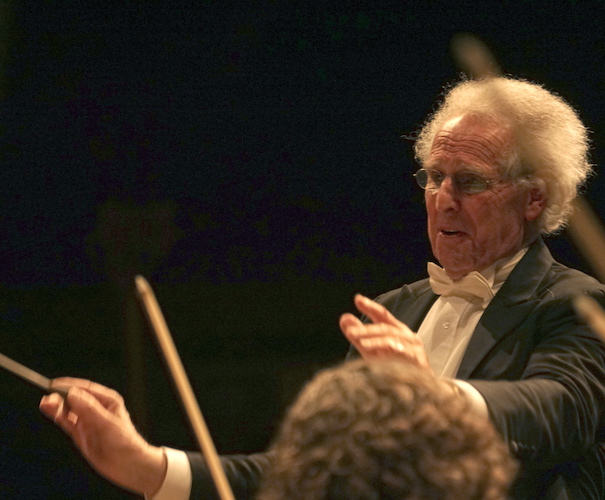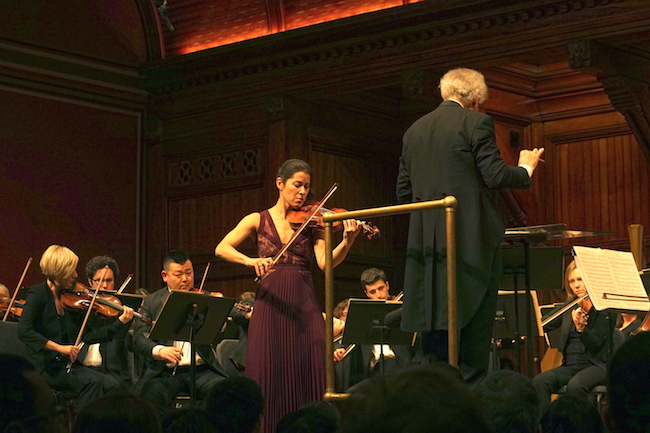Concert Review: Boston Philharmonic Orchestra at Sanders Theater
Edward Elgar’s brilliant scoring in his thrilling Symphony no. 1 was front and center, in this performance not an end in itself but serving clearly expressive goals.

Benjamin Zander conducting the Boston Philharmonic Orchestra at Sanders Theater. Photo: Dave Jamrog.
By Jonathan Blumhofer
For some reason or other, much of Edward Elgar’s most important music has long had the reputation of belonging to the special domain of British orchestras. By this I don’t mean the Enigma Variations, the Cello Concerto, or the first and fourth Pomp and Circumstance Marches: those have attained a worldwide level of popularity and acceptance. But how frequently do American orchestras (at least) trot out Cockaigne or Sea Pictures or The Dream of Gerontius or In the South (Alassio) or even the Violin Concerto? Not too often.
It’s ironic, certainly: after all, some of the best Elgar conductors – Georg Solti, Daniel Barenboim, and Andre Previn among them – don’t (or didn’t) hail from the UK and held major U.S. posts. But that hasn’t translated into an embrace of all things Elgar on these shores. This weekend, though, the Boston Philharmonic Orchestra (BPO) and its director Benjamin Zander, as English-accented a conductor as you’re going to find in these parts, did their part to rectify the situation by presenting Elgar’s stirring, thrilling Symphony no. 1.
Elgar wrote the piece between 1907 and ’08; its London premiere, in December 1908, was nothing short of a sensation. It’s still easy to see why. Elgar’s handling of the orchestra is wildly colorful and assured. His manipulation of form is intelligent and highly sophisticated. Indeed, the ways Elgar treated his materials in the Symphony – offering sharp contrasts of texture, tonality, mood – show a composer who’d not only learned the lessons of Beethoven and Mahler but internalized and personalized them in a distinct manner.
This is evident right from the start, as the first movement’s stately opening march winds down: the music moves – with no preparation to speak of – from A-flat major to the unrelated key of D minor and shifts in character from a secure, treading hymn to a scene of great turbulence and emotional chaos. It’s as unsettling a passage as you find in symphonic music of any age or era.
The three subsequent movements continue after this manner, if not always with such draconian violence: the climaxes of the driving second movement sound like the Imperial March getting run through a meat grinder; the hugely expressive third movement, with its swelling melodies and rich harmonic progressions, moves in a completely opposite direction. The finale sums everything up in potent, theatrical fashion. When that initial march theme makes its last appearance at the end of this movement, having been battered and bloodied all along the way, it offers one of the most sincerely moving and jubilant moments in all the repertoire.
In Sunday’s performance of the Symphony at Sanders Theater, that sense of triumph was abundantly present in the BPO’s reading of the finale, with its hurtling blasts and inexorable, persevering spirit. Indeed, the music’s ineluctable drive carried all before it: from the enigmatic opening bars to the dotted, syncopated main theme that threatened to careen off the rails more than once, this was an electrifying run-through.
So, too, the BPO’s account of the complex first movement, which, for the interpreter, offers plenty of opportunities to get sidetracked and meander. Not for Zander, though. He kept everything moving, the recurring statements of the opening march acting as signposts along the way. The BPO played with warmth, lyricism, and energy – especially the brass, whose zenithal statements were particularly vivid.
The second movement offered more playing of terrific energy: I’d not before heard the BPO strings execute with such unanimity of articulation and bite as they gave the furious runs in the opening pages of this music. And the brass brought crisp focus and raw power to their recurring, belligerent riffs. Concertmaster Joanna Kurkowicz offered a welcome respite with her several sweet, lyrical solos.
In the third movement – surely one of the greatest slow movements in the canon – the orchestra played with incandescent fervency.
Throughout the performance, Zander drew an extraordinary level of detail out of the orchestra. Elgar’s brilliant scoring was front and center, in this performance not an end in itself but serving clearly expressive goals. Every important moving part could be heard and lots of the little things – like Elgar’s delicate writing for harp – came across, too. Indeed, whenever the history of Zander’s tenure with the BPO is written (and it may be a while yet: he’s as spry and energetic a seventy-six-year-old as I’ve seen) this Elgar interpretation must surely be counted as one of its crowning glories.

Violinist Jennifer Frautschi performing with the Boston Philharmonic Orchestra, Benjamin Zander conducting. Photo: Dave Jamrog.
Possibly because the Elgar received most of the orchestra’s rehearsal time, the rest of the program Zander and the BPO presented didn’t consistently attain the same level of inspired playing.
At least Jennifer Frautschi proved an elegant soloist in Mendelssohn’s Violin Concerto, demonstrating true intonation and various shades of tonal color. After a tentative start, she turned in an intense and passionate account of the first movement replete with a blazing delivery of the closing pages and her take on the second movement was sweet without getting too sentimental. The finale was articulated well enough and offered nice moments of dialogue between soloist and solo winds but, on the whole, lacked a convincingly playful character.
Part of that problem may have derived from the sense that Zander, the BPO, and Frautschi seemed to have conflicting ideas about tempo. The outer movements offered their share of all parties pushing and pulling one another along; at times (like in the first movement), the natural tension that situation presented spurred all involved into some lively playing. But not always and especially not in the finale which, the lovely combination of melodic lines around its midpoint excepted, felt too earth-bound.
Better was the BPO’s account of Schumann’s Manfred Overture, itself a turbulent, grief-stricken memorial (of sorts) for Mendelssohn. Zander led an incisive, exciting reading of the piece, one lit by a crackling inner fire. If the violins tended to sound tonally chilly and somewhat thin, the rest of the ensemble – especially the low strings, with their warm, rounded tone conveying noble sentiment, and the winds – more than compensated for the shortcoming. In terms of dramatic locus, Manfred proved a particularly apt introduction to the Elgar and opened this most impressive of concerts in grand, stormy fashion.
Jonathan Blumhofer is a composer and violist who has been active in the greater Boston area since 2004. His music has received numerous awards and been performed by various ensembles, including the American Composers Orchestra, Kiev Philharmonic, Camerata Chicago, Xanthos Ensemble, and Juventas New Music Group. Since receiving his doctorate from Boston University in 2010, Jon has taught at Clark University, Worcester Polytechnic Institute, and online for the University of Phoenix, in addition to writing music criticism for the Worcester Telegram & Gazette.
Tagged: Benjamin-Zander, Boston Philharmonic Orchestra, Edward Elgar
